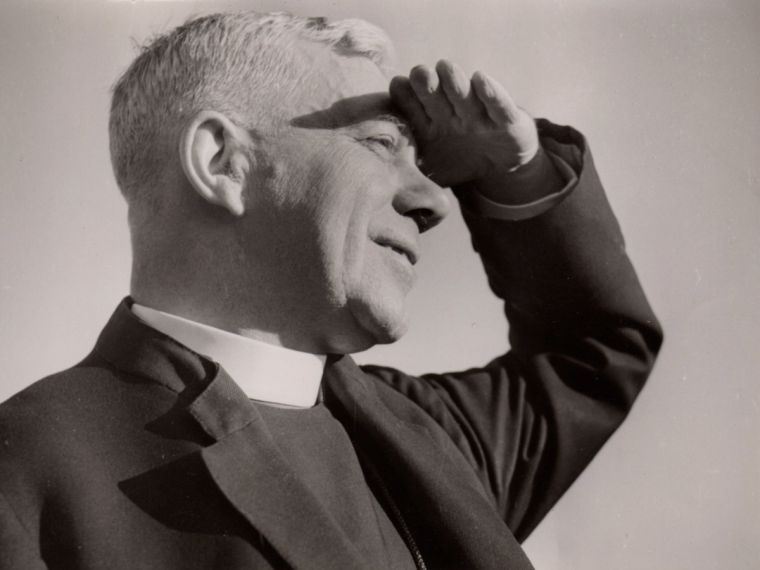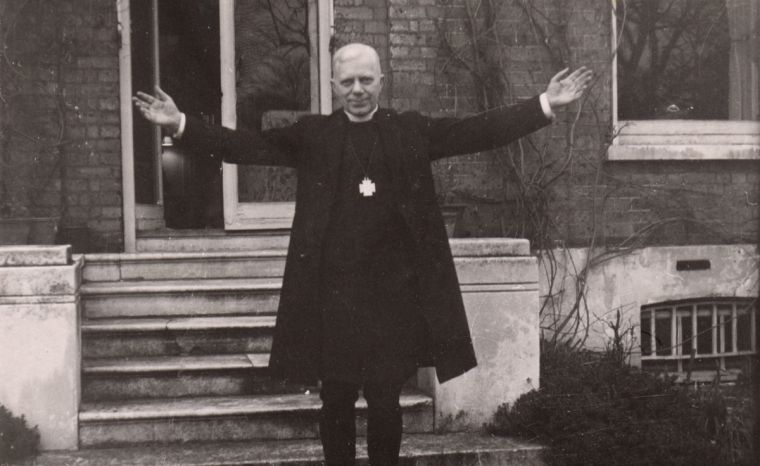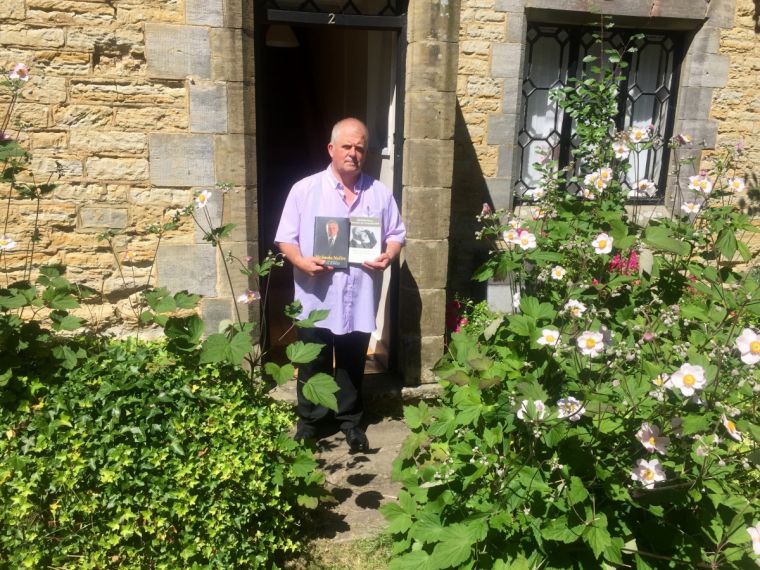Campaigners fight to give Bishop George Bell a 'fair' posthumous hearing on charges of child abuse

Senior figures across the British establishment have united with local campaigners in Sussex to call for a detailed re-examination of the evidence against the late Bishop of Chichester George Bell, recently accused of being a paedophile.
Lawyers, commentators, writers, members of the House of Lords and local residents around the areas Bell worked and lived want an apology by the Church of England to Bell's surviving relatives.
They are also calling for all institutions, such as schools, that have removed his name to restore it.
Andrew Chandler, author of the recent biography George Bell, Bishop of Chichester: Church, State, and Resistance in the Age of Dictatorship, and one of the founders of the George Bell Group, which is campaigning to have the assumption of guilt made against Bell reconsidered, said he and other leading figures in the group want an "authoritative reconsideration" of the process which led to Bell being denounced.
He told Christian Today that many people had found the Church's process "questionable".
In an appendix to his biography of Bell, he writes that no other English bishop of the 20th century left behind so much evidence of his own patterns of behavior.
"The 368-volume archive that Bell left to the Church and to the world of scholarship contains not only his correspondence and papers but also his personal notebooks, in which he committed private thoughts and the content of conversations, and all of his pocket diaries from 1919 to 1957, in which he wrote down his appointments and engagements.
"It is a very great treasure indeed, and to judge it as a whole requires many years of work and reflection."
He says it is important to place the allegations made public last year in the context of his record as a man with a "high view" of the standards demanded by his office as bishop, and as a public servant fashioned by his culture and era.
Bell was a man who documented meticulously every aspect of his life, and was widely known and observed, he writes.
He was also a man of rigorous piety, against which allegations of child abuse seem "anomalous", Chandler says.
He told Christian Today that he had spent 30 years thinking about Bell and had found him to be a "figure of integrity" in both public and private senses and a man with a "high regard" for truth.
A recent debate on historical child sex abuse in the House of Lords reflected the growing concerns among leading establishment figures about the George Bell case.
Conservative peer Lord Lexden, a member of the George Bell Group, cited a recent report produced by three academics and published by the Centre for Criminology at Oxford University, The Impact of Being Wrongly Accused of Abuse in Occupations of Trust: Victims' Voice.
The report documents the distress that has been inflicted on many wrongly accused men and women from all walks of life and backgrounds, describing the resultant loss of income, unemployment, family break-up and mental breakdown.
Lord Lexden said: "The report leads us to the heart of the matter with which this debate is concerned. It notes a cultural shift towards believing allegations of abuse, adding that the presumption now is in favour of believing those who present themselves as victims.
"It notes, too, that some reports assert that victims' accounts are being accepted at face value as evidence of the guilt of the person accused, with little attempt to find corroborating evidence.
"It is but a short step from such practices to the diminution, if not the reversal, of that most basic of our rights: that we are innocent until proved guilty. Is there a danger that that step might be taken in relation to the investigation of historical sex abuse allegations?"
Lord Lexden said that Bell, born in 1883, had been regarded as an "undeniably great figure" in the 20th century history of the Church of England.
He was Bishop of Chichester for nearly 30 years until his death in 1958, bringing fame to that diocese, and was a patron and friend of eminent people including TS Eliot and Gustav Holst. "He was continuously involved in combating injustice and suffering in Germany before and during the Second World War," said Lord Lexdon.
"Before 1939 no one did more to sustain and defend German Christians and Jews of all kinds in the face of Nazi persecution. During the Second World War he led the protests against the bombing of entire German cities which visited punishment on both the just and the unjust. This brought him much criticism, but no one questioned the deep Christian integrity of this saintly man," Lord Lexdon continued.
He said Bell had lived an "unblemished life, a model in every respect of what a great Christian leader should be, in private as well as public affairs"
He called for the person appointed by the Church of Engand to head the independent review on the case to have legal experience relevant to child abuse cases, to be willing to receive written evidence and submissions, to acknowledge that the burden of proof in civil proceedings rests with the claimant and to go further than a mere review of the processes.
Archbishop Cranmer blogger Adrian Hilton has also criticised the review. He wrote that because the review will be procedural, it will offer Bell no hope of absolution: "He is to remain a paedophile in perpetuity, 'on the balance of probabilities'."
Hilton has also noted that Chichester Council had resolved to restore a picture of Bell in its office. The picture was removed after the Church announcement of the compensation for fear of "vandalism".
Martin Sewell, from Gravesend in Kent, a member of the General Synod and a solicitor with 35 years of experience representing victims of child abuse, wrote to a local newspaper: "The Church's lack of transparency prolongs the agony for all, and its explanation that nothing can be said about its processes, because everything is confidential is misconceived in law." He said nobody was asking for clues to identity of the survivor, only evidence that a process of "due diligence" has been undertaken.
Along with David Lamming, he also asked questions at General Synod about the case.
He told Christian Today that he was not arguing Bell was innocent, just that there needed to be more transparency. "I am not convinced either way of his innocence. I was a child protection lawyer and know that you have to take the complainant seriously." Both he and Lamming are calling for a full review of the process and the evidence that resulted in the Church of England effectively branding Bishop Bell as a paedophile and paying compensation of £15,000 to the survivor, known as "Carol".

Another group, the Bell Society, has been set up by local campaigner Richard Symonds for people in and around Chichester to campaign for George Bell House in Chichester, renamed 4 Canon Lane after the scandal broke, to be restored back to its original name.
Symonds told Christian Today that he was not making judgement either way on whether Bell was innocent or guilty and also he believed the evidence that "Carol" had been abused by a cleric, but he wanted the question of identity of the cleric to be more closely examined.
He said the case had divided the community. He set up the group after mounting a vigil outside Chichester Cathedral.
"What I hope is that there will be a new independent review, that the evidence will be looked at again to right the wrong. That might sound as if I am thinking Bell is innocent. I'm not saying that. All we want is that the process is followed – innocent until proven guilty."

The Church of England last week defended its approach. Despite demands to publish the evidence against Bell, the Church cannot do this because of a "moral duty" to safeguard the victim. The survivor, Carol, has also said she is deeply hurt by the campaign to clear Bell's name.
A Church of England spokesperson told Christian Today: "We have commissioned a 'lessons learned' review into the George Bell case as we always do at the end of any complex case involving allegations of sexual abuse. As we said last week in response to the Bell Group it is singularly unattractive to suggest that because there might be no legal consequences to breaching Carol's confidence, the Church should simply provide sensitive material to a group of individuals with a keen interest in but no connection with the case.
"The Church has a wider duty to Carol than that: even were the Bell Group's analysis of the law correct. She has already expressed herself hurt by the campaign to 'clear his name' as it implies that she has not been believed."











